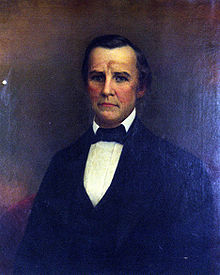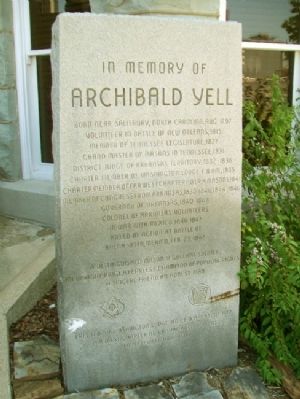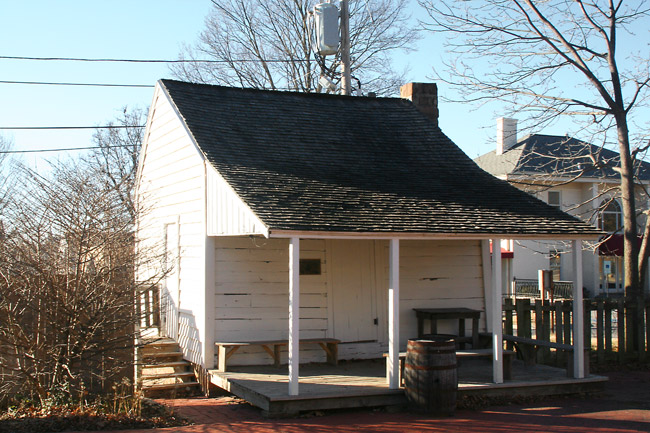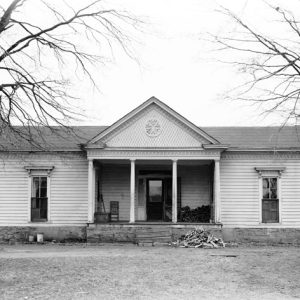By Dr. Curtis Varnell
Both during his life and after his death, Archibald Yell remains one of the most interesting and controversial figures in Arkansas history. Even his birth in August of 1797 is controversial with at least three differing states claiming his birth, with the most likely being North Carolina. It’s difficult to believe any man could pack as much life and be as involved in Arkansas and national affairs as Yell was able to do in his short fifty-year life-span.

Growing up in Tennessee, he was an ardent supporter of General Andrew Jackson and served with him during the Creek Indian wars. He later served with Jackson in Louisiana and was at the Battle of New Orleans. Returning from war, he studied for law only to again join Jacksons forces in the First Seminole War in Florida.
Yell was known as violent man with a temper. He was engaged in several brawls and duels, one involving a newspaper editor by the name of James Armstrong. The various arguments, duels, and brawls probably resulted in his willingness to move to Arkansas.

A close friend of President Polk, Andrew Jackson, Sam Houston, and other well-known historical figures, he used his associations to secure various political appointments. In 1831, he became head of the federal land office in Little Rock and was, at one time, offered the governorship of Florida Territory; a job he declined. In 1832, he was appointed Adjutant General of the Arkansas militia. Later, serving as a territorial circuit judge, he developed a popular following from his common man approach to life. When a local villain refused to come to court, Yell was said to have located the man in a nearby tavern. “Damn you; Come into court and answer to your name and the indictments against you, “he is said to have stated emphatically. Meekly, the man surrendered and faced the music. His colorful language and no nonsense approach won him a loyal following in the state. In 1836, he was elected as one of the first representative for the state of Arkansas. He was known for his entertaining speeches and his humorous non-nonsense approach but he could scarcely read and could not spell.
By that time, Yell had settled in Fayetteville and built a large Greek revival home and established a local law office. He helped form the first Masonic Lodge in Arkansas; Lodge 82 of Fayetteville. He ran for governor and was elected in 1840. Dropping out of politics for a time, he decided to run again in 1844; this time against David Walker, his fellow law partner and the man with whom he shared an office. Never a man for issues or politics, Yell ran on his personality. He would out drink, out shoot, and out talk any opponent. He joined in shooting matches and drinking contest and once, during a revival at Kings River, joined a local revival meeting and lead in singing hymns. He walked away with an easy victory over the more somber and serious Walker.
Back in Congress in 1846, he wanted to join with the various troops being sent to the Mexican War. Given the choice of remaining in Congress or fighting, he gave up his congressional position, and joined the Arkansas militia as a private. He was soon elected commander of the Arkansas Mounted Volunteers. Yell’s troops lacked any type of discipline. Drinking and carousing across Texas, the group caused so many problems that General Zachary Taylor refused to allow them to camp at the same sites as his regular army, instead moving them to the outskirts of the encampment. Called the “Mounted Devils,” General Wool described them as “wholly without instruction and with Colonel Yell fully determined to leave them in that condition.”
Regardless, Yell and his men were brave and willing to fight. When the battle of Buena Vista went south, Yell, with hundreds of Mexican troops in his forefront, bravely led a charge forward. With sword in hand, he brought down several Mexican troops before he was killed with multiple lance wounds. His charge was one of the turning points of the battle.
First buried on the field, his body was returned to his Fayetteville home and buried on a local cemetery.
Today, Yell’s life remains controversial. A man of his times, he appealed to the common working class man, was a consummate politician, and a prominent land-owner and lawyer. At the same time, he was a non-apologetic slave owner, a brawler, and a defender of states-rights. The town of Yellville and Yell County received their name from Archibald Yell, the rest of his legacy is left to history.







